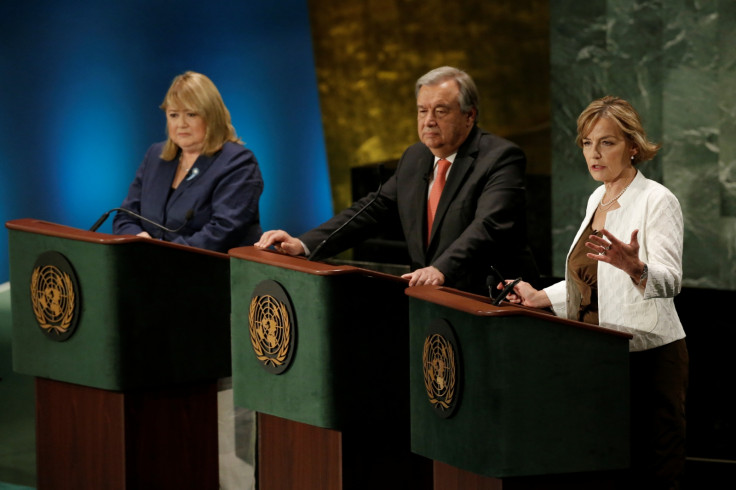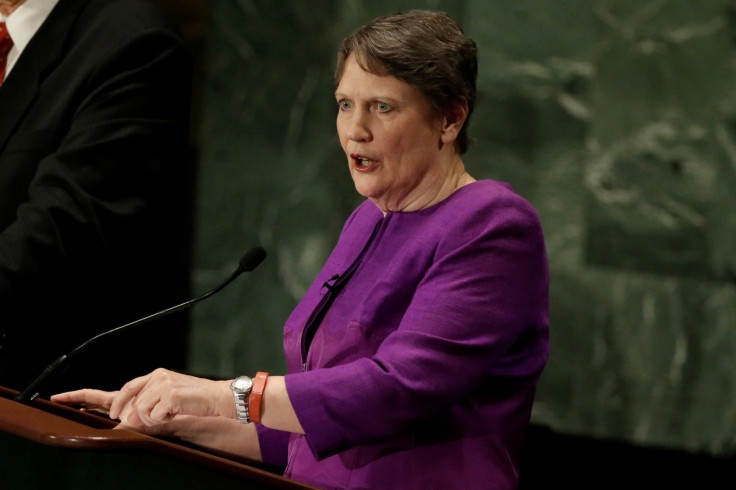'Old boys' network' sidelining women vying to be next UN Secretary-General, says campaigner
Campaign to Elect a Woman Secretary General says secrecy and chauvinism beset ballot for top UN post.

An "old boys' network" within the Security Council is to blame for the poor showing by women so far in the race to be the new Secretary-General, the head of the campaign for a female to be the world's top diplomat has told IBTimes UK. Jean Krasno launched the Campaign to Elect a Woman Secretary General amid much expectation that when Ban Ki-moon steps down, a woman could take over.
But so far two secret ballots by the Security Council have seen male candidates dominate, with former Portuguese prime minister, Antonio Guterres, coming first in both.
The head of UNESCO, Irina Bokova, from Bulgaria and Susana Malcorra from Argentina were the best performing female candidates in the field of 12.
Speaking from New York, Krasno said: "We are disappointed in the UK because for over a year they were saying it should be a woman and they were very outspoken about it.
"Now they are really backing away from it saying that we wanted women candidates, but not necessarily a Secretary-General. Then (UK ambassador to the UN), Matthew Rycroft came out and said: 'I will not veto a man'. Of the 15 members on the Security Council, 14 are men and the tendency for men is to vote for people that they know. It looks still like an old boys club for members of their club," she said.
A third ballot is due at the end of August. The other women candidates are the former New Zealand prime minister Helen Clark, Natalia Gherman of Moldova and Christiana Figueres of Costa Rica.
"We were very devastated on the first straw poll where many of the women were at the bottom, or near the bottom, so it was very frustrating. The second straw poll everybody went down a little bit but Malcorra emerged with a little bit of a better score," Krasno said.
Without naming a preference among the five female candidates remaining Ban Ki-moon said that when his second five-year term comes up at the end of 2016, it was "high time" for a woman to take over.
Bokova is considered one of the frontrunners, and in July, told IBTimes UK of the importance of having a woman head of the UN, saying: "I think it is important, it changes the culture, it changes the stereotypes. It is not about a different approach it's about telling the other half of humanity that they can take all the same jobs."

The eventual winner will need the backing of the Security Council's permanent members in a process which, until now, had been touted as the most transparent, with candidates going on the hustings trail, explaining their visions and policies.
But executive director of the United Nations Association UK, Natalie Samarasinghe, said that the secrecy of the straw poll results, where the 15 permanent members "encourage" or "discourage" candidates makes the Security Council seem "stubborn and out of touch".
"It was certainly disappointing to see highly experienced women not do as well as men with much less experience.
"I do think, however, that some of the criticism stems from the sadly misplaced hope that the council's view of what makes a good UN chief matches that of civil society. I wouldn't have thought that 'inspiring' is the foremost quality sought by certain P5 states.
"That said, some of the candidates who did well are clearly qualified. I would love to see a woman on the 38th floor – what a fantastic symbol for women and girls around the world. But the UN needs more than a symbol. We should be pushing for the best possible person.
"It would be an insult to any candidate – especially the women – to suggest the Secretary-General be appointed for any other reason," Samarasinghe told IBTimes UK in an email interview.
© Copyright IBTimes 2025. All rights reserved.






















